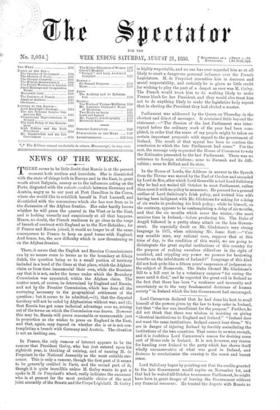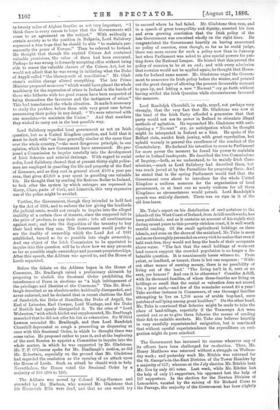Lord Salisbury began by pointing out that the credits granted
to the late Government would expire on November 1st, and that had he waited till October to summon Parliament, he might have been in great danger of leaving the Government without any financial resources. He treated the dispute with Ramie as
to twenty miles of Afghan frontier as not very important. "I think there is every reason to hope that the Governments will come to an agreement on the subject." With evidently a .certain anxiety as to the position in Bulgaria, Lord Salisbury expressed a firm hope that he should he able " to maintain per- manently the peace of Europe." Then he referred to Ireland. He thought that though the expired Crimes Act contained valuable provisions, the value of them had been overrated. Perhaps he was wrong in formerly accepting office without being able to renew the valuable clauses of the Crimes Act, but he would not admit that he was wrong in initiating what the Duke of Argyll called " the blarney-suit of conciliation." Mr. Glad- stone's sudden change altered everything. The late Prime Minister proposed measures " which would have placed the whole machinery for the repression of crime in Ireland in the hands of those who hitherto with too good reason have been suspected of being themselves the favourers and the instigators of crime." This had transformed the whole situation. It made it necessary to study the problem before them with very great care before announcing their policy in any detail. " We were returned with one mandate,—to maintain the Union." And that mandate they wished to carry out in the best possible way.



































 Previous page
Previous page